I find this 1942 Chevrolet Suburban interesting for two reasons. First, the Suburban nameplate, first introduced in 1935, is the oldest U.S. automotive model name in continual use. And second, finding a domestic 1942-anything is a surprise as so few were made during that early World War II year. Or is it… The seller states, “It has a CLEAR WYOMING TITLE 5DPB11608 (in my name). This specs out to be a 3100 1/2 ton 1946 from the Kansas City plant made in Feb (B letter ?)……..but old title I got from other owner had 1942 on it….so you be the judge. Title matches VIN tag on cowl“. Let’s examine this old truck and see if we can resolve the mystery. This forlorn-looking Suburban is located in Encampment, Wyoming and is available, here on eBay for a current bid of $6,700 with two bids tendered so far.
Well, it seems that the seller may have answered his own question as the VIN, 5DPB11608, breaks down as follows:
- 5 – Kansas City Assembly
- DP – 1946 1/2 ton (115″ wheelbase) commercial chassis
- B – February build
- 11608 – Sequence number
As for the 1942 title entry, it’s probably a simple typographical error. Appearance-wise? The ’42 and ’46 look the same to my, admittedly, untrained Suburban spotting eye. But that was common across most domestic brands as the ’46s often picked up where the abbreviated ’42 model year left off.
Untrained eyes or not, it’s easy to see that this Suburban’s better days are behind it. There’s no reason to mention the condition of the finish as that’s obvious, but rust and dents abound. That prominent grille, however, looks pretty good though the seller mentions that it has likely been repaired. The front clip is actually not original to this Suburban and is from a different truck though mentioned is the inclusion of some additional parts including original fenders, another radiator w/ support, a fan shroud/odd bracket, and a front bumper. While the tailgate is suffering from some notable deterioration, the doors are said to open and close properly.
When running, power is produced by a 90 HP, 216 CI, in-line six-cylinder engine which is claimed to be “free”. What’s there appears to be original, and mostly untouched, with the exception of a more modern-day fuel filter added. Research indicates that a three-speed manual transmission was the only gearbox selection available.
Inside, the seller mentions that the floors are sound, and even the windows still roll up and down. While the wooden cargo bed is said to be solid, the second and third-row seats are missing leaving essentially, just a pair of stripped front seat frames. The original instrument panel is still front and center and could possibly be restored.
It would seem that the model year confusion has been easily resolved but regardless of model year, this second-gen Suburban is still a remarkable find. That said, it needs a lot of work and begs the question, what (besides sticking an LS under the hood) would you do with this very early SUV?
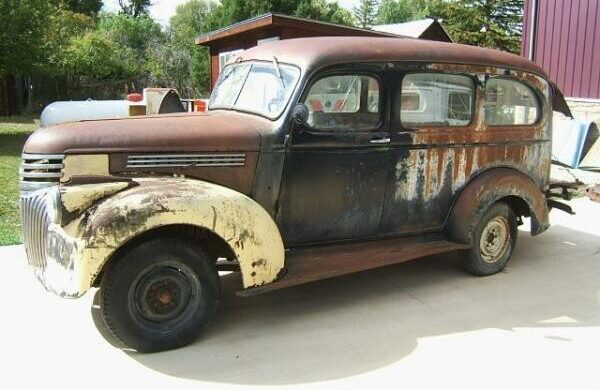
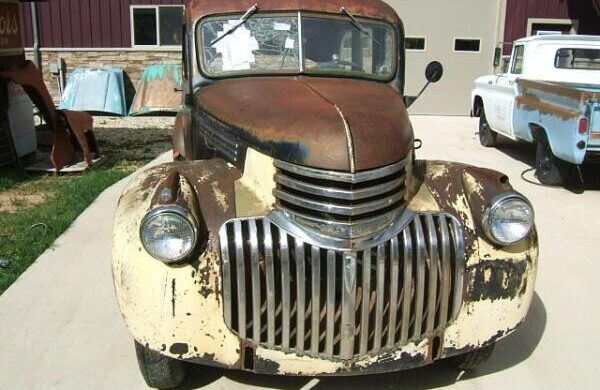
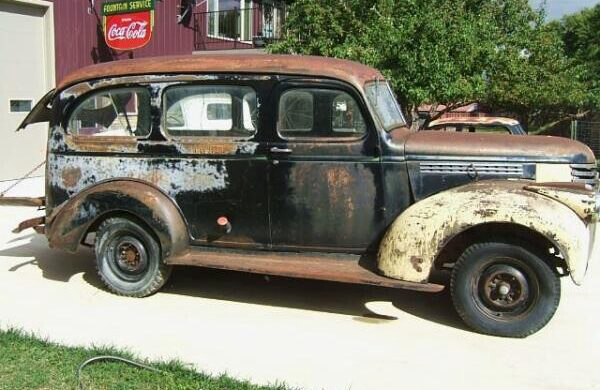
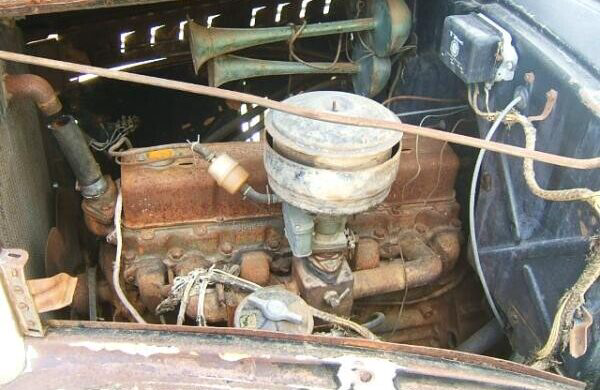
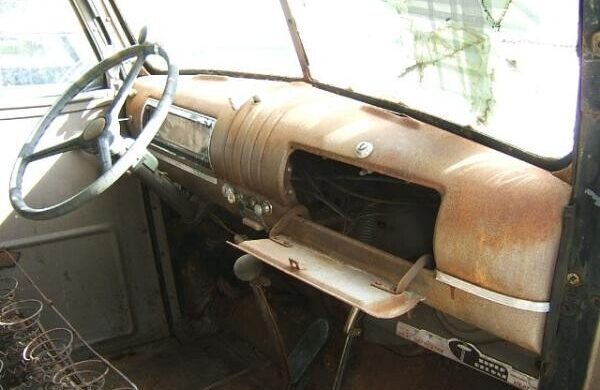
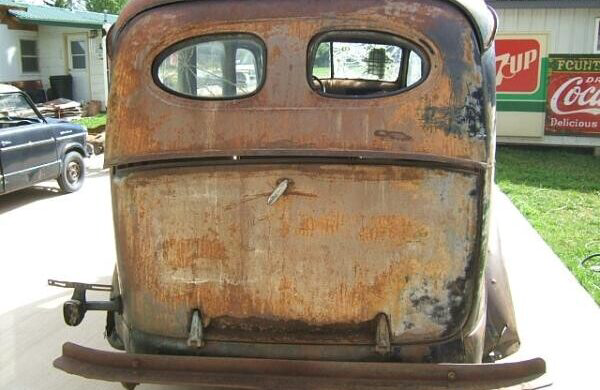




By 1942, cars weren’t allowed chrome plating. I see where the front clip is not original, but maybe the back bumper or other trim could provide a clue ?
Here’s the ’42 Suburban via the sales brochure, with stainless and chrome plating attached.
Seems odd that chrome plating wouldn’t be allowed for ’42 model vehicles. When the ’42 model year started, we weren’t even at war yet as U.S. war involvement started in Dec. ’41 and car production ended only two months later in Feb. 42. It was true, however, at the beginning of the ’46 model year.
JO
Chrome was a part of the cars sold to the public thru Feb ’42, however there were select batches of cars made for the government and a very few people who needed a reliable car because they were doing special jobs for the war effort. These cars, often painted in OD green, often didn’t have any chrome and the stainless steel parts were painted over.
A great example of one of these OD green cars is the 1942 Packard built for Gen MacArthur and shipped to him in the Pacific theater of war. This car was discovered still in it’s original condition about 30 years ago, and it’s been written up in numerous car magazines.
After the war, right after the manufacturers were permitted to resume car and truck production, a few early examples, due to material shortages, were shipped to dealers with temporary wood bumpers and no spare tire. These were quickly changed once the parts were available.
One of the quickest way to tell the difference between a prewar and postwar Chevy truck, if you can’t see the VIN, is the parking lights on top of the fenders. If I remember correctly, prewar versions were 2-piece housings, & the top part was chromed cast metal. Post war trucks were single piece stainless.
Some car makers didn’t even try to hide the fact that the cars and trucks
they were selling had serial numbers
going back to ’42. There was a war on, and trucks like this were needed
by all services on all fronts. So why
not keep the serial numbers going
even after hostilities ended. There was a lot of confusion when car and
truck production resumed as companies were eager to supply the pent up demand for new vehicles when the seller’s market started. Ford confused a lot of future restorers when they issued a flathead
that was a hodge podge of parts from
’32 to ’45 in order to offer rebuilt engines to customers that needed them. So yeah, it could be a ’42 or ’46, but it’s an old truck that needs to be saved no matter what.
This old Burb would be just fine with a 350, or even a 292 straight six. This LS swap business is outta hand….
This truck deserves a shot at a new life. If I had room and funds, I’d do it, but that’s not an option for me currently.
Good morning,
This is one of those vehicles you don’t think of until you see one and when you do and then you start dreaming. Yes I would love to have one also but with all my cars I have no room nor the finances to restore it. My 3 retirement checks are all planned out in advance.
Every body have a good day,
Bill
PS: Just thinking about the chrome I remember the Lincoln Continental in “42 had all that beautiful chrome and was my favorite, but maybe that was because it was the rarest of all the early Continentals. I never verified this fact so someone please correct me if I am wrong.
I was10 year-old and living on a ranch orphanage in Kansas when this jewel was built . SO many swell things I would love to own, The Docs say I’ll make it too 115+. better start on one of them.
Both three and four speed manual transmission available. This one has the shift with a reverse lock out for a four speed. As good of condition that she is in, Keep her as close to original as possible. She has a lot of sweet accessories from the day. Already too many hack jobs out there. I am figting the temptation as I am currently working on a ’47 1st(looks same as this one) with rear barn doors.
I bought this one ☝️ on eBay. Have a lot of plans for it when I get it back and it won’t be an LS swap it Lol 😂. If anyone happens to know history on this one chime in
Congratulations Nate,
I wish you all the luck in restoring this JEWEL. Thanks for stating no LS swap. That is a big heavy vehicle and as I stated earlier I would put a 261 six in it and that will give you all the power you need. If you cannot find a 261 then drop down to a 235 which can be bored 90 over but most people bored them 80 over. The head can be angle milled reducing the combustion chamber and raising compression. Dual exhaust would help with power and gas mileage.
Disc brakes on the front with the master cylinder and booster under the floor. You don’t want that on the firewall
Have I spent enough of your money yet? Good luck to you and your project.
Bill